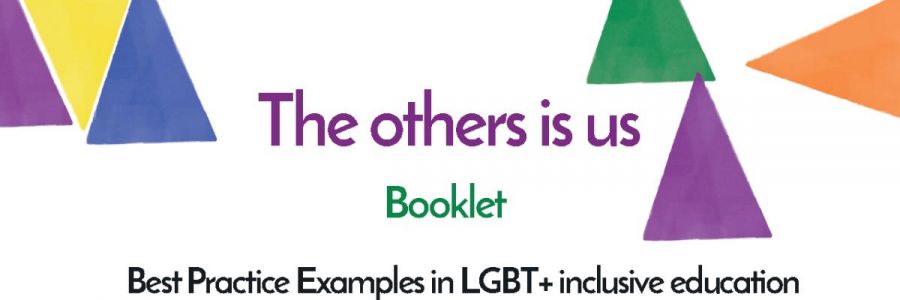The Others is Us - Best practices in LGBT Inclusive Education (2016)
The project “The Others is Us” was an international seminar, realized within the frame of the European Erasmus+ program. It was designed to raise competences of youth educational workers, in the field of antidiscrimination education and human rights, with a focus on LGBT + topic, in relation with schools. The seminar took place in Łódź, Poland between 13th and 18th June 2016 and gathered 20 participants from 8 European countries. During 4 days of the seminar the participants shared experience, knowledge and expertise on the topic, using experiential learning and non-formal methodology.
Best practices
This resulted in the description or 11 best practices. The best practices range from interactive exercises to multi-year projects and the creating of an LGBT office in a university:
- Queer Cyprus uses the Aurora exercise. In the exercise, participants are asked how to live on a planet where there are only same-sex partnerships and where public affection is forbidden en severely punished.
- UniCa LGBT+ from Italy created the Ferai Theatre. With University students, in 40 hours a comic theatre play is developed up and then performed.
- Fabryka Równości from Poland uses the Living Library. The Living Library is a place where real people are "on loan” for a conversation with visitors. In the dialogues, difficult questions are expected, appreciated and answered.
- The Rede Portuguesa de Jovens do projects in which youth are encouraged to make posters for equality and think about messages and communication.
- The Fundacja Instytut Działań Twórczych developed the Inni to My (The Others is Us) project. This is an educational cycle to promote LGBT safer schools. The cycle starts with teacher training on homophobia and transphobia and promoting each participant to carry out 2 school initiatives. There are follow-up meetings with the training group and both group and individual coaching. The project is closed with an evaluation day and the publication of a toolkit with useful tools. At a final conference the results are disseminated to a wider target group.
- ACCEPT from Romania explained their Story Off My Life method. Small groups of students join to combine their personal stories into a joint one, using text and pictures. They present the story to the other groups. They may use role play to do this. The different stories are discussed and the participants review how diversity works.
- Fundación Triángulo from Spain recently created an Office of Sexual Diversity and Gender Identity in the Complutense University of Madrid. The office provides personal support, research, teaching and awareness raising and campaigning.
- YINFO in Turkey uses an exercise called: Now What? . The participants are offered a set of scenario's with daily challenges that can occur around homophobia and transphobia. Each scenario ends with the question: now what? In small groups the scenario's are discussed and different options to act up are reviewed. At the end of the exercise, the participants are given the opportunity to share their personal experiences.
- Rede ex aequo from Portugal uses a workshop based on the gender bread kit. The workshop explores the perceptions and responses of participants on gender, gender identity, sexual orientation and self-expression.
- ACCEPT from Romania also talked about "It's time to fight LGBT discrimination in high schools!" This project offered schools a set of resources and training during LGBT History Month.
- Saplinq (Slovakia): PRIDE Rainbow Košice. Organizing a Pride event in a conservative environment.


